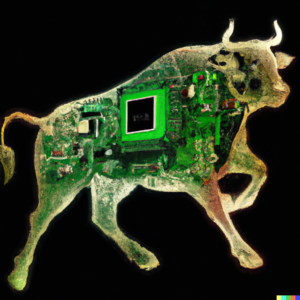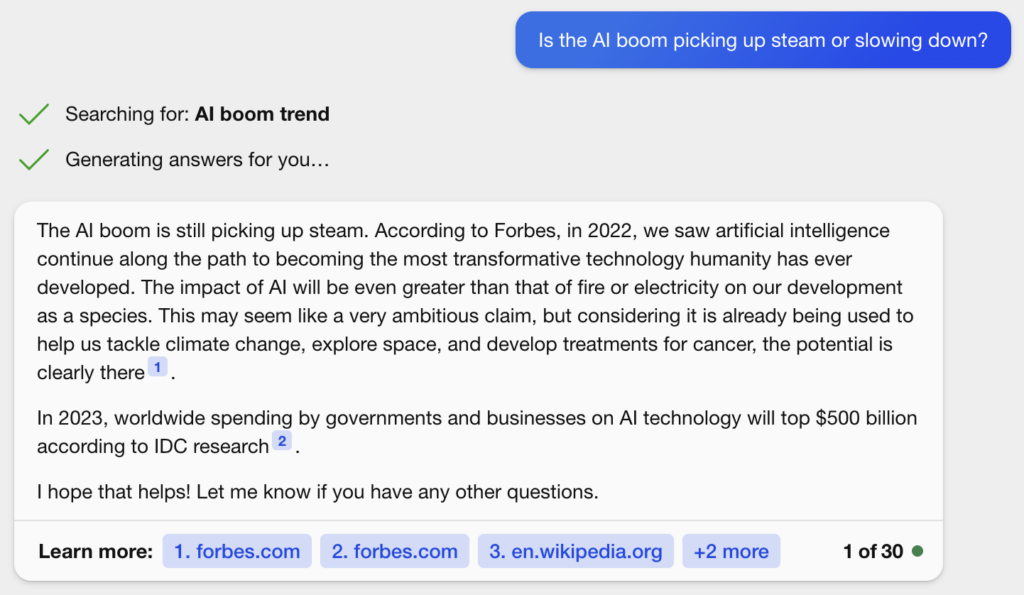Welcome to the latest edition of FindBiometrics’ AI update. Here’s the latest big news on the shifting landscape of AI and identity technology:

Nvidia reported soaring demand for its GPUs in a quarterly update this week, helping to illustrate ongoing innovation and growth in AI technology. The consensus estimate for Q2 earnings among Wall Street analysts had been $11.5 billion; Nvidia came out reporting $13.51 billion in sales, and predicting revenues of $16 billion for Q3. “We have excellent visibility through the year and into next year,” said CEO Jensen Huang. “I think this is not a near-term thing, this is a long-term industry transition.”
That may help to set the stage for the forthcoming IPO of Cambridge-based Arm, which is slated to hit the Nasdaq next month. Arm is looking to expand its presence in the AI sector. It practically has to: Arm already claims a 99 percent market share as a provider of smartphone processors, leaving little room for growth there. In AI, the company is better known as a provider of cloud computing infrastructure rather than a maker of the GPUs that are used to train AI algorithms.
NYC-based Hugging Face has raised $235 million in a new funding round featuring Nvidia, Intel, Google, Amazon, and Salesforce. The company makes AI software and provides hosting services for other companies. Its latest funding round brings its valuation to $4.5 billion, with the company planning to use much of the new capital to hire talent.
Researchers from the University of California have developed an AI-powered system that can turn brain signals into speech, literally giving voice to individuals who have lost the ability to speak. The system is not yet perfect; it can register about 15 words per minute, with an accuracy rate of 75 percent (in terms of correctly reading brain signals). But researchers have also been training another part of the AI system to mimic subjects’ natural voices by training it on recordings, allowing subjects to once again ‘speak‘ in their own voice (in a manner of speaking).
The United Kingdom is organizing a global AI summit for November 1-2, inviting government officials and tech executives to participate. The UK government says the summit will “build on ongoing work at international forums including the OECD, Global Partnership on AI, Council of Europe, and the UN and standards-development organisations, as well as the recently agreed G7 Hiroshima AI Process.” Matt Clifford, the CEO of Entrepreneur First and Chair of the Advanced Research and Invention Agency, and Jonathan Black, an academic and former G20 and G7 advisor, will “spearhead talks and negotiations” in their effort to draw in AI experts and other officials.
State lawmakers in Wisconsin have established an “Artificial Intelligence Task Force” that will assess various AI tools, including facial recognition technology, and their use in elections, business, and the public sector. Led by chair Rep. Nate Gustafson (R-Neenah) and vice-chair Rep. Steve Doyle (D-Onalaska), the task force will focus on ethical issues pertaining to the technologies.
Garrick Brazil has become a Senior Scientist at ROC.ai. Brazil completed his PhD at Michigan State University’s Computer Vision Lab, where he studied under the renowned computer vision and machine learning expert Xiaoming Liu. Brazil has also served in research roles at the Max Planck Institute for Informatics and Meta, working in the latter’s Fundamental AI Research lab.
The chatbot’s take: After Nvidia’s earnings surprised Wall Street, we asked Bing about the overall AI trend. Bing is bullish.

–
August 25, 2023 – by Alex Perala








Follow Us